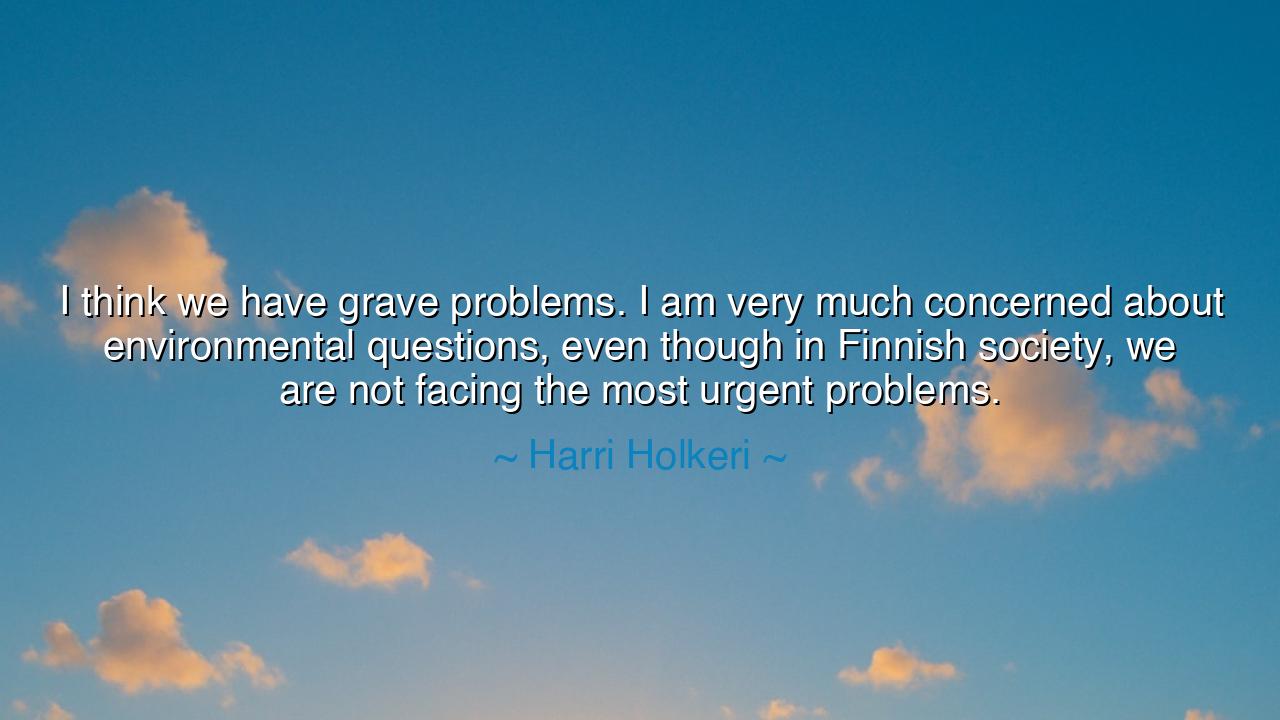
I think we have grave problems. I am very much concerned about
I think we have grave problems. I am very much concerned about environmental questions, even though in Finnish society, we are not facing the most urgent problems.






The words of Harri Holkeri, “I think we have grave problems. I am very much concerned about environmental questions, even though in Finnish society, we are not facing the most urgent problems,” echo like the voice of a watchman on the walls, calling out warnings even as the city within slumbers in comfort. They remind us that the absence of immediate danger does not mean the absence of peril, and that wisdom consists not only in reacting to crises but in preparing before they strike. Holkeri, a Finnish statesman and peacemaker, looked beyond the momentary calm of his homeland to the storms gathering across the earth.
The origin of this saying lies in Finland’s unique place among nations. Blessed with vast forests, countless lakes, and a relatively small population, Finland has long enjoyed a measure of environmental stability compared to nations scarred by pollution and overpopulation. Yet Holkeri, serving as Prime Minister and later as a diplomat, recognized that the grave problems of the environment were global, not local. He saw that Finland could not isolate itself from the degradation of the planet, for air and water know no borders, and the fates of nations are bound together like the roots of a forest.
History offers us a mirror in the tale of Easter Island. For centuries, the people there thrived, building monuments and cultivating their land. To the casual observer, their society seemed stable. But slowly, through deforestation and overuse, the island’s resources collapsed, and with them the civilization itself. They did not face the “most urgent problems” until it was too late. Holkeri’s words echo this ancient tragedy, reminding us that the wise do not wait for collapse to act, but confront dangers before they reach their most urgent stage.
The deeper meaning of Holkeri’s statement is a call to foresight and responsibility. He teaches us that even societies not in crisis must not look away from the global struggle. The comfort of the present can blind nations and individuals to the peril of tomorrow. Just as a family may live in peace while their neighbors suffer war, yet eventually be swept into the same storm, so too do nations share one destiny in the face of environmental decay. Holkeri’s voice, therefore, is not merely Finnish—it is universal, reminding us that concern must reach beyond our own doorstep.
His words are also a rebuke to complacency. Too often people imagine that because their water runs clean, because their forests still stand, they are spared the need for action. But the truth, as Holkeri declared, is that the grave problems belong to all humanity. A factory in one land pollutes the air of another; the melting of ice in the north raises seas for the islands in the south. No society, however stable, is beyond the reach of the world’s wounds.
The lesson for us is plain: we must cultivate the habit of vigilance. Whether we dwell in lands scarred by pollution or lands still green and pure, we share a responsibility to protect the earth. Let us act not only in crisis, but in foresight. Let us reduce waste, cherish resources, and support leaders who see beyond the horizon of the present. Let us remember always that what is not yet urgent may soon become unstoppable if ignored.
Therefore, let us walk in the spirit of Holkeri’s wisdom. Do not wait for the fire to burn your own home before you bring water to your neighbor’s. Do not wait for the forest to fall before you plant the first tree. Do not wait for the seas to rise before you teach your children to honor the land. The time to act is not when the problems are “urgent,” but when they are seen—when the voice of concern first speaks.
So let Holkeri’s words be remembered: “I think we have grave problems. I am very much concerned about environmental questions…” They are the counsel of a man who saw beyond his own nation, beyond his own generation, into the shared fate of humanity. Let us hear them as both warning and guidance, and let us act while there is still time, so that the comfort of today does not become the ruin of tomorrow.






AAdministratorAdministrator
Welcome, honored guests. Please leave a comment, we will respond soon